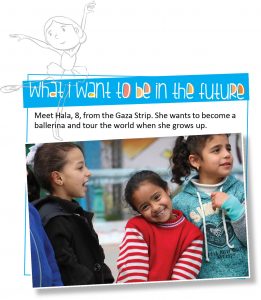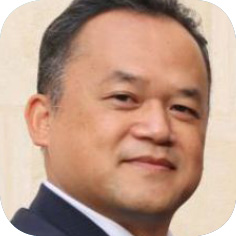 In a world with ongoing crises and conflicts, children continue to pay the highest price. Instead of living a normal life, feeling safe and secure, children are being exposed to violence, destruction, and displacement.
In a world with ongoing crises and conflicts, children continue to pay the highest price. Instead of living a normal life, feeling safe and secure, children are being exposed to violence, destruction, and displacement.
Having a safe home and easy access to services – such as electricity, sewage, and clean water – has unfortunately become only a dream for hundreds of thousands of children. Increasing complexities in our world have shown us just how dependent we all are on infrastructure. From our homes to the schools where we send our children, to the hospitals that care for the sick, infrastructure affects every aspect of our lives and impacts our ability to live and flourish in a functioning society.
In honor of the 30th anniversary of the CRC, United Nations Office for Public Services (UNOPS) reaffirms its commitment and recognizes the fundamental human dignity of all children and the urgency of ensuring their well-being and development. We are positioned to be a leader in support of sustainable infrastructure development, which we view as playing an integral role in protecting and promoting the rights of every child. UNOPS understands the value of a home for children and their families, and how it contributes to brighter futures. Pursuant to Article 27 of the CRC, we believe that every child has the right to a standard of living that is adequate to meet their physical and social needs and supports their development. We also believe that a home is a fundamental structure in which a family can ensure a natural environment for the growth and well-being of all its members, particularly children.
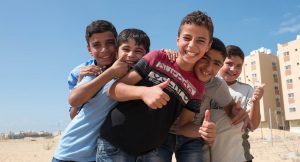
At UNOPS, we feel responsible and more determined to provide an adequate standard of living by creating and supporting quality infrastructure with greater access to services to guarantee children’s rights and allow them to live in dignity and safety.
In 2016, we started a house reconstruction project in Gaza funded by the Federal Republic of Germany, through its German Development Bank KfW. Through this project, we have rebuilt 180 homes for some of the most vulnerable families in Gaza, providing a safe and secure space for around 390 children. A space that will remain dry as heavy rains pour, and a space in which to safely play with their friends and siblings and keep their toys.
In light of the 30th anniversary of the United Nations Convention on the Rights of the Child (CRC), UNOPS highlights the importance of investing in sustainable and resilient infrastructure, which is vital for improving the living standards of all children and their families. Through infrastructure, the world can fight inequalities and provide opportunities to those most vulnerable. Accordingly, infrastructure helps make the world a safer place for these children.
Infrastructure, however, also plays a very important role beyond the home. To help provide energy and respond to the ongoing electricity crisis in the Gaza Strip, we have developed a project that aims to reconstruct and strengthen the electricity supply system in Gaza with renewable energy. With funding from the government of Japan and in close coordination with the Palestinian Ministry of Public Works and Housing and the Energy and National Resources Authority, UNOPS installed solar photovoltaic systems to create reliable and sustainable access to electricity, providing families across Gaza – approximately 1,160 residents – with essential services. Children of these households can now – with the flick of a switch or the push of a button – have access to light, heat, and communication.
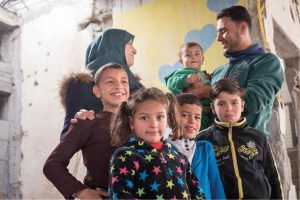
Sustainable electricity sources such as these allow children in Gaza to exercise their fundamental rights, such as studying after dark with the lights on, having a warm shower, eating hot meals, enjoying entertainment, or charging their mobile devices and laptops. Renewable energy sources also allow disabled children or others with health conditions to use medical devices efficiently at home without having to go to the hospital.
Every child is entitled to have the best chance for a healthy, happy life. This requires that each child have access to professional and responsive services, including medical care. Thus, to improve living conditions and secure critical and essential health care services for approximately 100,000 Palestinian patients in Gaza, including children, we have developed another project to install and implement a sustainable electricity source at the European Gaza Hospital.
Pursuant to Article 19 of the CRC which is concerned with the protection of children from violence, abuse, and neglect, UNOPS is working hand in hand with the State of Palestine through its governmental and ministerial institutions and bodies in the justice sector to improve the rule of law, justice, and human rights for women and children in the West Bank. To achieve this, we established and fully equipped seven “safe facilities for women and children” in seven different public prosecution districts around the West Bank.
These safe facilities aim to create a child-friendly and stable environment for both women and children who are witnesses or victims of various types of violence or abuse. The design of the facilities allows the interviewed mothers to observe their children playing in specially designed rooms through the use of a glass divider installed between the prosecution room and the children’s room, helping to protect children’s privacy and dignity.
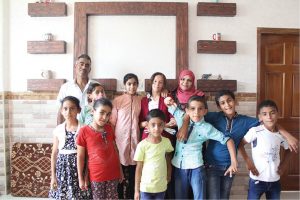
Infrastructure plays a key role in safeguarding children’s rights and is the foundation for development. It plays a central role in preserving human dignity and improving well-being not only for children but for all humanity.
Housing infrastructure provides protection, shelter, and a stable place to call home. Energy infrastructure helps people to access affordable, reliable, sustainable, and modern energy which offers a family and a community the opportunity to grow, develop, and improve their quality of life in a sustainable way – giving them the power to change for good.
The protection of children’s rights can only be achieved with the support and joint efforts of governmental and nongovernmental organizations, the donor community, development partners, and the private sector to implement infrastructure services that are essential for the healthy development and the future well-being of children.
We, at UNOPS, stand ready to continue to contribute to these efforts.
For more information, please contact Ms. Fidaa Maaytah, UNOPS Jerusalem Office Communications Assistant, mobile: +972 (0) 54 324 9322; office: +972 (0)2 628 1881; e-mail: fidama@unops.org.
For more information about UNOPS, please visit our website: www.unops.org.
